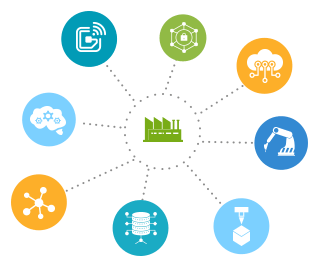
Industry 4.0:
The latest buzzword – Industry 4.0 is the fourth industrial revolution wherein the traditional manufacturing sector is on the verge of digital transformation. This transformation is accelerated by advanced technologies such as robotics, data analytics, 3D printing, and Internet of Things and will change the way businesses function. To remain ahead, businesses need to quickly adapt to this rapid change. Such a widespread adoption by manufacturing companies across the communication and information technology world would pave way for new methods to production, development and the whole logistics chain.
This phase of industrial revolution involves the digitization and automation of manufacturing, production and industrial processes by making use of advanced technologies. The objective is to manage the entire value chain by improving production efficiency while coming up with innovative and high-quality products and services. In other words, we are about to witness smart factories wherein all processes will be performed smoothly, efficiently and seamlessly.
Our agile and innovative warehouse management system offers total cost of ownership to businesses as compared to traditional warehouse management system. Through our centralized and automated warehouse management solution, organizations can enjoy better flow of information across the organization. This provides them with better business insight, control and growth. This easy to use and scalable system also provides certain levels of control that allow users to manage resources, as well as storage space in warehouse operations. It also provides supply chain visibility along with real-time management of inventory and status of order across various warehouses of an organization.
Characteristics of Industry 4.0:
- Vertical Networking: Though, smart factories remain central to industry 4.0, they cannot function individually and require networking with smart production systems, smart products etc. The need for vertical networking arises from the usage of cyber physical production system that allows manufacturing units and plants to be responsive towards various contingencies such as machine defects, low stock and demand levels, unexpected delays etc. Apart from this, integration and networking also involve logistics, marketing and other smart services as production is tailored to meet customer requirements.
- Horizontal Integration: This will facilitate the creation and maintenance of networks that can add value. Horizontal integration could not just be correlated with relationship that exists between customers and business partners, it could also mean the integration of different business models across the globe.
- Through Engineering: This includes highlighting the entire product life cycle by subjecting the value chain through-engineering. Rather than single focus on the manufacturing process with very little to no focus on the output, Industry 4.0 covers both production process, as well as the end-product.
- Acceleration through Exponential Technologies:IThe use of advanced technologies for fulfilling business operations especially for businesses involved in manufacturing industry would soon be used for mass-market application. This happens because these technologies have risen in popularity due to reduced price and their increased computing power.
3D Technology
An innovative technology that has created new paradigms in the manufacturing industry is the 3D printing technology. Also known as additive manufacturing, this technology has enabled businesses to overcome the limitations of traditional production processes. With this, businesses have started realizing improved process efficiency, production capabilities and more at an optimized cost. Prolitus Technologies – A leading name in the IT space offers 3D printing services and solutions for businesses across different industry verticals.
Read More

